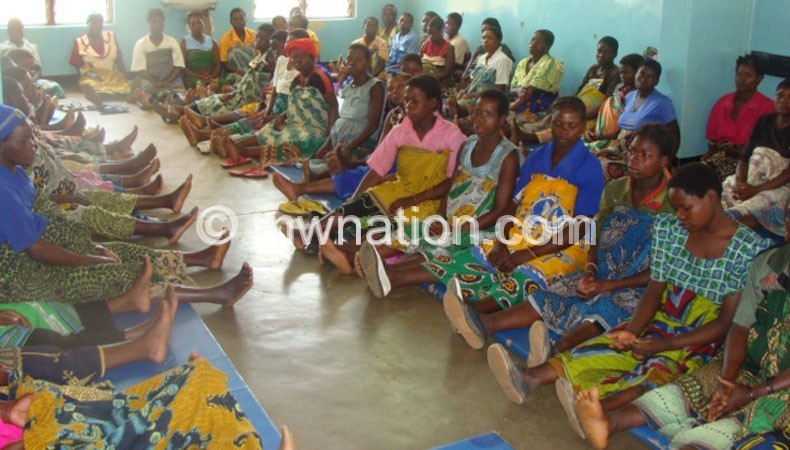Women who deliver their grandchildren
She is not a midwife, nor is she a traditional birth attendant (TBA). However, without any kind of training, she helped her daughter deliver a baby. She does not like the experience.
Group Village Head Ngunga from Senior Chief Kawinga’s area in Ntaja, Machinga still has memories of the day circumstances forced her to be her daughter’s midwife right at a health centre.

When her daughter became pregnant, Ngunga advised her to attend antenatal sessions at the nearest health centre. Being a traditional leader, she encourages pregnant women in her community to deliver at health facilities.
“I told my daughter the importance of delivering at a health facility with the help of qualified people and she did not hesitate. She started attending antenatal classes right away,” says Ngunga.
When her daughter was due to give birth, Ngunga took her to Liwonde Health Centre.
“We arrived at the hospital around 7pm, but when the nurse examined her, she told us that the labour was not advanced and that my daughter would deliver after 10pm,” she explains.
Ngunga says with those words, the midwife disappeared to attend to other patients and left her with her daughter.
“After about 10 minutes of the midwife leaving, my daughter’s labour became intense and she gave birth to my grandchild.
“I went numb, not knowing what to do and afraid the baby might fall down. Without any gloves, I helped deliver the baby and called for help,” says Ngunga.
She says when the nurse came, she took the baby, helped her clean up and apologised to Ngunga.
Sharing Ngunga’s experience was Lenny Nanthambwe from the same Senior Chief Kawinga’s area.
Nanthambwe met her ordeal at the beginning of September this year when she went with her pregnant daughter to Ntaja Health Centre for delivery.
She says upon some checks by a midwife on the daughter, she was told labour had not started yet and it would take a day or two for her daughter to deliver.
The midwife then went to the antenatal section to talk to some pregnant women who were waiting for her all the time she was attending to Nanthambwe’s daughter.
“I wondered why she had said my daughter would deliver in a day or two when it was clear she was in labour,” says Nanthambwe.
Nanthambwe says her daughter was clearly in intense pain and when she approached the midwife to cross examine her again, the midwife just ignored her.
“At this moment, I got mad, started pacing up and down, thinking I was going to lose my daughter and her unborn child. But the nurse told me to calm down,” she explains.
She says while the midwife went about doing other business, her daughter started delivering and the nurse only attended to her after the baby was born.
“I was so furious to think that I could have lost both my daughter and her baby. I started calling the nurse bad names and said I would report her to hospital authorities, but she apologised and asked me not to take the issue further. I did not,” Nanthambwe says.
These two cases are examples of challenges that pregnant women face in public hospitals. To reduce the country’s high maternal mortality rate, which is currently at 675 per 100 000 live births, government banned TBAs, encouraging pregnant women to seek skilled health care in hospitals.
However, the quality of that care is proving to be a challenge. Too often, pregnant women seeking maternity care meet various challenges—from lack of adequate health workers in hospitals, long distances to health facilities and poor treatment by health workers.
Evidence is now emerging that the fear of being badly treated and abused in health facilities, as well as the cost of care and transport, deters pregnant women from seeking professional maternity cares in hospitals.
While it is advisable that whenever women meet harsh treatment from the care providers they must report to authorities, most cases go unreported like those of Ngunga and Nanthambwe.
However, when Senior Chief Kawinga heard the experiences of the two women during a meeting organised by the Pan African Civic Educators Network (Pacenet) under the Issue Based Voter and Civic Education project being carried out in Machinga, he could not hide his disappointment that the women did not report their experiences.
“It is sad that we continue to suffer in silence. Exposing such issues helps protect others who might have experienced the same problem because it was not dealt with in the first place,” said Kawinga.
The Senior Chief said it is sad to note that while traditional leaders are doing their best to encourage their subjects to deliver in hospitals and putting in place penalties for offenders, some health workers are failing to assist the women accordingly thereby frustrating the traditional leaders’ efforts.
Concurring with the senior chief, Alex Maferano, environmental health officer for Machinga said it is important for women who face any form of abuse at a health service in the country to report to authorities.
“It is sad that I am learning of the women’s experiences at this meeting. If cases like these happen at any hospital in the country, it is important that the aggrieved parties notify the hospital in charge or any other senior official for appropriate action,” he said.






This is very very unfortunate